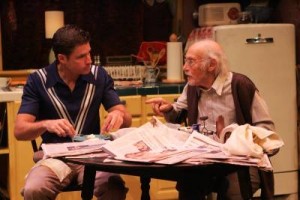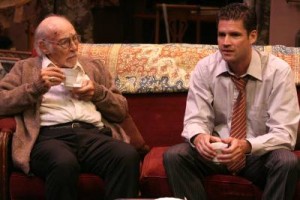
The “Odd Couple Two-Hander” has become something of a Colony Theatre specialty over the past few years. Take a mismatched duo, put them in the same space, and watch the sparks fly. The two characters can be the same sex or opposite, they can be the same age or decades apart, and the space in which they find themselves can be indoors or outdoors. All that is required is that those sparks start flying.
2007’s Rounding Third concerned a pair of Little League dads whose personalities and lifestyles couldn’t have been more different. Last year’s Educating Rita featured an uneducated hairstylist and an erudite but alcoholic university professor. Most notably, the Colony’s 2007 megahit Trying matched a fledgling twentysomething secretary with a cantankerous octogenarian Supreme Court Justice boss.
Now comes Jeff Baron’s Visiting Mr. Green, and like its predecessors, it’s a winner. Despite the play’s having been translated into 22 languages and performed in 37 countries, including a 1999 run at the Pasadena Playhouse, it had somehow passed under my radar. That knowledge gap has been rectified by the Colony in a production that easily meets the standards of its illustrious predecessors.
Visiting Mr. Green would likely not have been 29-year-old Ross Gardiner’s first choice for spending six months’ worth of Thursday evenings, but a judge has sentenced him to community service after having nearly run over the elderly widower. No matter that Mr. Green didn’t look both ways until after he walked into traffic, Ross has admitted to possibly driving a bit too fast, and for the next half a year, he will be [insert tile of play].
As might be expected, Mr. Green (Jack Axelrod) is none to happy to have “a murderer” in his apartment, nor is Ross (Antonie Knoppers) happy to be there, but since Mr. Green has had his phone disconnected (“I’m supposed to pay good money to get wrong numbers?”), Ross decides to wait until the next day to phone social worker Mrs. Fanelli to tell her he’s an unwanted visitor.
A week later, Ross is back (there wouldn’t be a play if Mrs. Fanelli had said “Okay, hon, you don’t need to visit Mr. Green”) and this time he’s arrived bearing food. “No! Get it out of here! Get it out!,” screams Mr. Green to Ross’s dismay, and it’s only after assuring Mr. Green that the soup is 100% Kosher, from Fine & Shapiro no less, that Ross can get the old man to sample it. Naturally, it doesn’t hold a candle to the soup Mr. Green’s recently deceased wife Yetta used to make, but that doesn’t stop Mr. Green from eating it up.
By the time the fourth Thursday has rolled around, the 80something widower and the 20something bachelor have begun to get to know each other a bit better. Mr. Green has learned that Ross too is Jewish, that he is training for a marathon, and that he doesn’t speak Yiddish. Ross has learned some basic rules for keeping a Kosher kitchen, a bit about Mr. Green’s family history, and quite a bit more about the way Russian Jews were persecuted in the old country when Mr. Green’s parents emigrated to America at the start of the 20th Century. This Thursday, Mr. Green tells Ross how he met and fell in love with his beloved Yetta. “Fifty-nine years we never once had an argument,” the elderly curmudgeon tells a more than slightly dubious Ross. Now, suggests Mr. Green, if only Ross would ask a girl to go out with him someplace instead of training for a marathon, then maybe the young man could find some of the happiness Mr. Green found with his beloved Yetta.
It’s right about here that Ross says something to Mr. Green that prompts the old man to say, “You know what? I think I’m gonna lay down,” and sends the audience out into intermission with a new piece of information to digest.
Spoiler alert! Click here to find out what Mr. Green learns, and how this piece of information makes Visiting Mr. Green particularly relevant in today’s world. Those who’d prefer not to know too much, feel free to read on.
Director David Rose has staged more than 25 Colony productions over the past two decades, and Visiting Mr. Green is one of his best yet. An actor himself, Rose knows how to bring out the best in his cast, and he blocks his two actors in a way that never allows the action to become static.
As Mr. Green, Axelrod gives a performance that rivals Alan Mandel’s award-winning turn in Trying. Both men are actors who only get better as the decades pass. Axelrod’s Mr. Green is by turns exasperating, endearing, heartless, engaging, bad-tempered, frustratingly stubborn, intolerant, witty, and wise. It is a masterful performance.
Knoppers has the more difficult assignment. Ross is so tightly-wound and gives away so little of who he is, at least in the first act, that it is not until after intermission that the young actor gets words and scenes he can really sink his teeth into. Act One belongs to Mr. Green, the second act is shared equally by both old man and young man, and the angrier Ross gets at Mr. Green, and the more he tries to get through to the closed-minded senior, the better the talented Knoppers gets.
Scenic designer David Potts has created a marvelously messy Upper West Side apartment, filled with both the clutter of decades and the emptiness of a lonely widower’s life without his Yetta. (Properties design and set dressing by MacAndME.) Costume designer A. Jeffrey Schoenberg dresses the two men to perfection, Mr. Green in ratty old sweaters and trousers, Ross in business suits and conservative casual. Jeremy Pivnick’s lighting design casts just the right illumination on Mr. Green’s “economically-lit” apartment. Sound designer Cricket S. Myers ties scenes together with some great New York jazz, as well as recreating the sounds an ancient apartment makes.
Over the course of Visiting Mr. Green’s two hours, the lives of two very different men intersect and are transformed. Audiences too may find themselves altered, and their understanding of human nature just a bit richer, from having spent two hours visiting Mr. Green.
Colony Theatre, 555 North Third Street, Burbank.
www.colonytheatre.org
–Steven Stanley
August 29, 2009
Photos: Michael Lamont




 Since 2007, Steven Stanley's StageSceneLA.com has spotlighted the best in Southern California theater via reviews, interviews, and its annual StageSceneLA Scenies.
Since 2007, Steven Stanley's StageSceneLA.com has spotlighted the best in Southern California theater via reviews, interviews, and its annual StageSceneLA Scenies.







 COPYRIGHT 2024 STEVEN STANLEY :: DESIGN BY
COPYRIGHT 2024 STEVEN STANLEY :: DESIGN BY